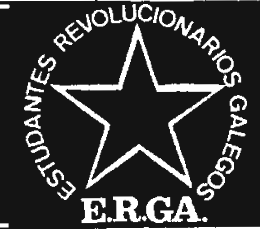
The Galician Nationalist Bloc is a political alliance of left-wing Galician nationalist parties. It is self-defined as a "patriotic front".

Galician Revolutionary Students was a leftwing nationalist students organization in Galicia, Spain. ERGA functioned as the students wing of the Galician People's Union (UPG). ERGA was founded in 1972. ERGA published a monthly, Lume. ERGA was the first mass organization of nationalism after the civil war, got a broad presence in the universities and high schools of Galiza and formed future UPG leaders and militants.

Communist Party of National Liberation was a separatist political party in Galicia, Spain. PCLN was founded on 25 July 1986 by the 22 March Communist Collective. The collective had been launched earlier by 13 Central Committee members of the Galician People's Union (UPG) left UPG in protest of the decision of the Galician Nationalist Bloc to participate in the Galician parliament. Front figures of the collective was Mariano Abalo, general secretary of UPG, and Xan Carballo, general secretary of INTG.
Galician Workers' Party was a political party in Galicia, Spain.
The Galician People's Union is a Galician nationalist and communist political party, and is one of the registered political parties of Spain. The party publishes the magazine Terra e Tempo, and the secretary general is Néstor Rego.
The Galician People's Front is a Galician political organization with a socialist and independentist ideology.

Galician nationalism is a form of nationalism found mostly in Galicia, which asserts that Galicians are a nation and that promotes the cultural unity of Galicians. The political movement referred to as modern Galician nationalism was born at the beginning of the twentieth century from the idea of Galicianism.

Xosé Manuel Hixinio Beiras Torrado is a Galician politician, economist, writer and intellectual. He is professor of Structural Economy at the Faculty of Economic Sciences of the University of Santiago de Compostela. He is a former member of the National Council of the Galician Nationalist Bloc, he is currently the leader of Renewal–Nationalist Brotherhood, an independentist political party. He formerly had representation in the Galician parliament.
Loita Armada Revolucionaria was an armed Galician nationalist and left-wing independentist organisation. Linked to the political party Galician Party of the Proletariat and the organization Galiza Ceibe-OLN, the group was formed in 1978 and carried out several attacks around Galicia, such as bank assaults and bombing campaigns.

Renewal–Nationalist Brotherhood is a political party in Galicia. Formed in 2012, under the guidance of historical leader Xosé Manuel Beiras, Anova was formed by Encontro Irmandiño, the FPG, Movemento pola Base, the Galician Workers Front and independent militants. Anova defines itself as a Galician nationalist, socialist, feminist, Galician independentist, ecologist, internationalist organization. Its internal organization is run by assemblies.
The Assembly of the United People (APU) was a Galician political organization, with an independentist, socialist and feminist ideology. It was formed in 1989 from a split of the first Galician People's Front, and disappeared with its self-dissolution in 1995.

The National Inter-Union of the Galician Workers was a Galician union with an anticapiltalist, leftist and Galician nationalist ideology, direct heir of the Intersindical Nacional Galega (ING), and precursor of Confederación Intersindical Galega (CIG).

The Galician Party of the Proletariat (PGP) was a party galician independentist and Marxist-Leninist party formed in March 1978, as a continuation of Galician People's Union-Proletarian Line, a split of the original Galician People's Union. The Central Committee was clandestine, and even the party militants didn't know the members of it. Tha party supported armed struggle, which considered as anti-imperialist and anti-oligarchic. Its official magazine was called Sempre en Galiza.

The Galician Movement for Socialism is a Galician communist, pro-independence and feminist organization. The MGS was born in March 2009, although its origins go back to the summer of 2006. The MGS works inside the Galician Nationalist Bloc and the Confederación Intersindical Galega.

The Galician National-Popular Bloc was a Galician electoral candidacy. It had as the national sovereignty for Galiza as its main objective and as an alternative to autonomism. It was formed by the Galician People's Union (UPG) and Galician National-Popular Assembly (ANPG).

The Galician Socialist Party–Galician Left was a Galician nationalist and left-wing party of Galiza.

Commitment to Galicia is a Galician political party with a Galician nationalist, progressive ideology.

The Galician independence movement or the Galician separatist movement is a political movement which supports the independence of Galicia and Galicia irredenta from Spain, plus the North Region from Portugal (Gallaecia).
The Galician Armed League was an armed organization formed by former members of the GRAPO. They injured two policemen in 1978, and claimed to have killed a Guardia Civil the same year in Santiago de Compostela, though the GRAPO also claimed the murder. The group was completed disbanded in 1980.
The Exército Guerrilheiro do Povo Galego Ceive was an armed organization formed in 1986 mainly by members of Galiza Ceibe-OLN. It was considered a terrorist organisation by the Spanish Government. The main goals of the organization were the independence of Galicia and the transformation of society according to the principles of socialism. The EGPGPC was operative between 1987 and 1991, a time during which the EGPGC made a total of 90 armed actions and a multitude of provisioning actions.











